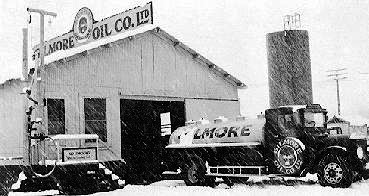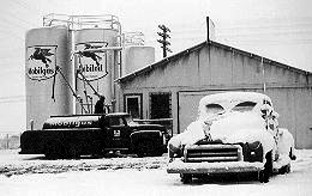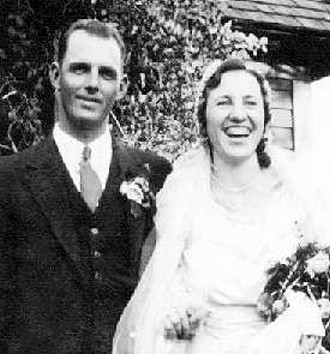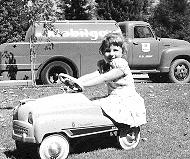Polli:
Daddy, tell about the time you hid the alarm clocks in Hal’s
Drug Store!
Dorothy: She wants you to tell what
an angel you were when you were young and foolish!
Elwood: Aw, the fire
department used to go down to Hal Devoist’s pharmacy, he
had an ice cream fountain there that was about 50 feet long,
and had kind of a curve. The firemen went in there, 12 or 14
of us. As soon as we’d get done with a meeting, why we’d
head for Hal’s and we’d all get ice cream, see?
Polli: This was just
downstairs from the Jost Hotel.
Elwood: And up in the
front he had a bunch of alarm clocks, these Big Ben alarm clocks,
there must have been 150 alarm clocks in this stack--had ‘em
all stacked up in boxes, and they had them on a sale price. So
somebody got the wise idea. . . .
Randy: I want to know
whose wise idea it was? Which Jost it was?
Elwood: Hal DeVoist
wasn’t there that night, Carl Lovelace was there. So we
got ahold of Carl Lovelace and made a deal with him, if he’d
keep his mouth shut we’d have some fun. So we said, who’s
going to open? He said, Hal opens in the morning. And I said,
what time does he open up? And he said, seven or seven-thirty
or something. So we all got up there and took these out of the
boxes, and we wound them all and we’d set ‘em, starting
at seven o’clock or at seven-thirty, every five minutes
we had these alarm clocks set. And we put ‘em back in the
boxes and planted ‘em all over the store, clear back into
the medicines and stuff--wherever they had stuff, they’d
put ‘em clear in the back end. So anyhow, that morning he
got there to go to work, and he’d no more than opened the
door up and the darn telephone started ringing. So he made a
run for the telephone, and he, hello, hello, hello--nobody answered,
you know? That was kind of funny, so he set it down, and about
that time the darn phone rang again. So he grabbed it again.
Nobody was there, see? So about that  time, why, he
began to think, well that doesn’t sound like the darn telephone.
So he said, I’ll fix it! So he left the receiver off. And
it would ring again, see, then he knew he was fixed! And then
he looked up front and all the alarm clocks were gone! All day
long that day those alarm clocks were going off every five minutes!
But he told us afterward, you know, that was the best sales idea
I ever had. He said, I sold everything I had in the store; people
had to come in to hear about it! He never found all of ‘em, ‘cause
after a while they’d run down, you know. So two years later
they were renovating, putting new shelving in, and here they’d
run into a lot of these alarm clocks that were stashed all over
the darn place.
time, why, he
began to think, well that doesn’t sound like the darn telephone.
So he said, I’ll fix it! So he left the receiver off. And
it would ring again, see, then he knew he was fixed! And then
he looked up front and all the alarm clocks were gone! All day
long that day those alarm clocks were going off every five minutes!
But he told us afterward, you know, that was the best sales idea
I ever had. He said, I sold everything I had in the store; people
had to come in to hear about it! He never found all of ‘em, ‘cause
after a while they’d run down, you know. So two years later
they were renovating, putting new shelving in, and here they’d
run into a lot of these alarm clocks that were stashed all over
the darn place.
Randy: How many years
were you with the fire department?
Elwood: Oh, boy, I
don’t remember, it must have been 25 years or more.
Randy: Did you ever
have any close calls, anything dangerous?
Lance: Didn’t
you burn your lungs once?
Elwood: I still have
problems with that. It was at Weiffel’s Mortuary, in the--oh,
where they put the stiffs when they freeze them--the embalming
room. Years ago their refrigeration was all sulphur. When the
fire burnt through and broke those tubes, why we got sulphur
burns, and I got my lungs burned with sulphur. I had to go to
the doctor, went to Dr. Reeves, and I was in awful shape. I couldn’t
breathe, my lungs were burnt. He said he was giving me enough
penicillin to kill a horse. And every time now if I get a cold,
I’ve got to run down and get a shot of penicillin right
quick or it goes right down in my bronchial tubes.
Dorothy: Of course,
it was a volunteer fire department. The firemen worked
in various places, and had an understanding with their bosses
that whenever there was a fire they were supposed to go. So when
we were first married that was one of the fun things we did,
we’d get together for dinners and things like that. And
they had  quite a thing
chivareeing any new bride and groom. And when we were married
we knew it was coming! So, sure enough, one night here they came,
took us by surprise one evening, and, "Come on, it’s
your turn to have your chivaree!" So they came with the
fire engine, and had us both sitting up on the seat of the fire
engine, drove through town, tooting the horn, ringing the bell.
So they got down there--you know where the old theater in town
is, on Ramsey Street, and it was right about the time that the
first show was letting out, about nine o’clock. And they
had us get out and walk up and down the street across from the
theater where the people were getting out, and they made Daddy
wheel a baby buggy. . . .
quite a thing
chivareeing any new bride and groom. And when we were married
we knew it was coming! So, sure enough, one night here they came,
took us by surprise one evening, and, "Come on, it’s
your turn to have your chivaree!" So they came with the
fire engine, and had us both sitting up on the seat of the fire
engine, drove through town, tooting the horn, ringing the bell.
So they got down there--you know where the old theater in town
is, on Ramsey Street, and it was right about the time that the
first show was letting out, about nine o’clock. And they
had us get out and walk up and down the street across from the
theater where the people were getting out, and they made Daddy
wheel a baby buggy. . . .
Elwood: They had a
ball and chain on my leg, and I had to carry that ball with one
hand and wheel the baby buggy with the other.
Dorothy: . . . Then
they took us up to our house--they had to have refreshments!
And they had gone to town and they had bought cake and ice cream
to feed those big old hungry lugs. And they would eat ice cream
and then drink hot water, and then eat more ice cream and drink
hot water so they could eat more ice cream. And then they gave
us the bill for all that ice cream and cake! Could you imagine,
$7.50 for all that ice cream and cake, and we had to pay for
it!
Elwood: In those days,
a quart of ice cream only cost about 15 cents. The kitchen sink
was stacked, tiered up with quarts of ice cream!
Randy: How many were
there?
Elwood: About 16 men
and their wives.
Randy: So it cost you
$7.50? What year was that?
Dorothy: 1932. Our
grocery bill ran $15 a month! The other thing we had to remember
was, we wives found out, that if we heard the siren in the middle
of the night, and if we’d hurry and get our clothes on real
fast and get in the car we could go along and see the excitement.
So this one night I hurried and got my clothes on, about 2 or
3 o’clock in the morning, got out in the car so I could
go along. And we could see down southeast of town there was a
great flare, so there was no need to go by the fire barn to find
out where the fire was or anything, we knew right where
it was, so we headed for it. Got down there, and all the firemen
were there, and not a one of them had stopped for the fire engine.
The first one to the fire engine would always drive it to the
fire.
Randy: Weren’t there antiques and things in the bar?
Elwood: Charles
Farrell, the movie actor, owned a building down there,
and he had things stored--a tally-ho, old stagecoaches,
and a calliope, and all of it burned up.
Randy: Did anybody
finally go back and get the truck?
Elwood: Yeah,
but it didn’t do any good. In the first place, we
didn’t even have a pumper on the truck, all we had
was a hose. And they didn’t even have a fire hydrant
down there in that part of town. We had two soda and acid
tanks on there, we had about 30 gallons of soda and acid,
and with a fire that big, it wouldn’t have done any
good even if we had had it--even if we had water it wouldn’t
have done any good. So they had a big piece in the paper
about it--the firemen made it, they saved the ground, but
lost the buildings! Well, Farrell had it insured, don’t
worry about that. A week or two later he bought steaks
for us.
Lance: A bunch
of burnt-to-a-crisp steaks! Thanks for your good work!
Elwood: When
I first went to work with them, we worked for nothin’,
just to be a fireman. And then years later, the city finally
voted us a dollar a fire. Later, Tuffy Stuart, Harry Mitchell
and myself, we went around and talked to all the city councilmen,
and they agreed to give us a raise to a dollar and a half
a fire. And the next year we went back and told them we
wanted more than that, because we’d lose more than
that in clothes! So they finally decided they’d give
us a dollar and a half to start, and a dollar an hour as
long as we were at the fire. So we’d save all our
money for vacation. One year we saved it all year and we
had a hundred dollars for vacation!